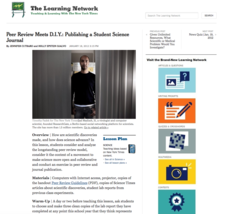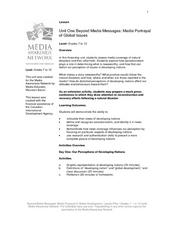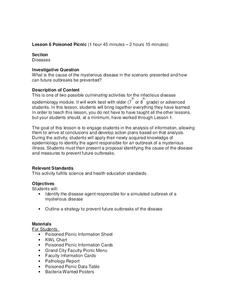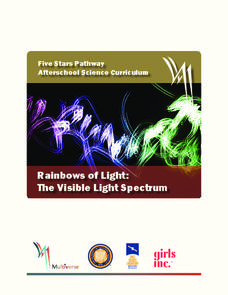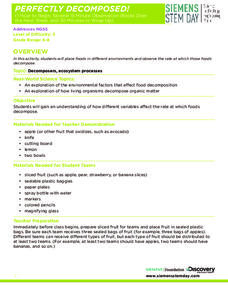Curated OER
Peer Review Meets D.I.Y.: Publishing a Student Science Journal
Peer review of science laboratory reports? You bet! First, learners work in pairs to review a scientific article. Then they trade lab reports for peer review. The end result is the publication of a classroom scientific journal!
PHET
Planetary Magnetism
What do magnetic fields look like? The best way to learn about magnetic fields is to try identifying them for yourself. Scholars will understand the importance of magnetic fields after completing this experiment. The extension activities...
Howard Hughes Medical Institute
Got Lactase? The Co-Evolution of Genes and Culture
Does the human body evolve as quickly as human culture? With a stellar 15-minute video, explore the trait of lactose intolerance. Only about 1/3 of human adults seem to still have the enzyme lactase and therefore, the ability to digest...
Foundation for Water & Energy Education
How is Flowing Water an Energy Source? Activity C
Can the force of falling water through a tube vary by altering the diameter of the tube or its height? That is what physical scientists aim to discover in this activity, the third in successively more revealing activities on the power of...
Foundation for Water & Energy Education
How is Flowing Water an Energy Source? Activity B
Explore the world's water without leaving the classroom! In this second of three uncomplicated but wonderful activities, physical science learners feel the pressure of water. They discover that the deeper the water, the stronger the...
K-State Research and Extensions
Water
How are maps like fish? They both have scales. The chapter includes six different activities at three different levels. Scholars complete activities using natural resources, learn how to read a map, see how to make a compass rosette,...
American Forest Foundation
Who Speaks for the Trees?
Help young conservationists appreciate the important role that trees play in ecosystems around the world with this collection of six engaging activities. From a shared reading and class discussion of Dr. Seuss' The Lorax, to in an depth...
Curated OER
Scale Activities
How do you put something as large as the universe in perspective? Use a series of scale experiments. Classmates collaborate around four experiments to examine the scale of the earth-moon system, our solar system, the Milky Way galaxy,...
Science 4 Inquiry
Journey Through the Spheres of the Earth
Each of the Earth's spheres interacts with the other spheres in predictable ways. Young scientists explore these interactions through a hands-on activity, graphing, and watching a video. They summarize their knowledge in a video or...
Curated OER
Beyond Media Messages: Media Portrayal of Global Issues
Take a close look at news reporting techniques and global issues. Begin by creating a graphic representation of developing nations and defining the term. After class discussion, the second day's activities pick up by deconstructing news...
Wild BC
Greenhouse Gas Line-Up
Discuss different sources of energy and how much greenhouse gas each might emit. The six sources are then ranked according to emissions from greatest to least. Finally, the true cumulative emissions are revealed to show the class how...
University of Florida
Investigating the Fungus among Us
What do you call a fungus that writes music? A decomposer! Here, young biologists explore fungus by tasting fungus (blue cheese) to creating art with fungus to playing a board game centered around, you got it, fungus. Surprise scholars...
Centers for Disease Control and Prevention
Poisoned Picnic
A group of teachers attended a picnic; ten became sick and another four died. Young scholars must solve the mystery of what happened. They research the river, waste water treatment plant, each food that was served, and environmental...
DiscoverE
Build a Bridge
Cost overruns are unacceptable—in the real world and in an engaging activity. Groups of pupils get together to build a bridge out of straws, paper cups, and tape. They keep track of costs ($1,000 for each material) and must stay within a...
Science 4 Inquiry
Musical Vibes with Palm Pipes
Ancient people used musical pipes as early as the third millennium BCE. Young scientists explore the workings of musical pipes to better understand the relationship with frequency, length of pipe, and sound waves. They determine the...
Curated OER
Comparing Mitosis with Meiosis
Life science learners view an online animated mini textbook comparing two types of cell division. Working in groups, they use a digital microscope to capture images of cells in different stages of mitosis and meiosis. Then they create an...
Curated OER
Ice Cream Lab
I scream, you scream, we all scream for ice cream! Even high schoolers enjoy making ice cream. This laboratory exercise has them record the temperature changes throughout the process of liquid becoming solid, graph the results, and...
Multiverse
Rainbows of Light: The Visible Light Spectrum
Rainbows can teach us about the visible light spectrum. Learners observe multiple items that clearly display a rainbow to develop better connections. The lesson then explains wavelength using a rope to make waves.
Mascil Project
Design and Build Your Own Vacuum Cleaner, Hair Dryer or Toy Car
No vacuum cleaner? No problem, just build your own. Scholars apply knowledge of currents to build a model of either a vacuum clear, a hair dryer, or a toy car. While the class completes the activity, instructors consider gender...
Discovery Education
Perfectly Decomposed!
We all know someone who won't eat the banana with a brown spot, the grape with a dimple, and the apple with a bruise. Scholars use different fruits to explore what happens when fruits really start to decompose. They set up an experiment...
Science 4 Inquiry
Layers of the Earth
We can't dig a hole through the Earth, so how do we know about the layers beneath our feet? Scholars learn about layering through hands-on exploration of common materials. They study the characteristics of each layer and apply their...
Curated OER
Testing for Life’s Molecules
Want to hear a joke about sodium? Na. Young scientists test various materials to identify if they include protein, starch, and glucose by using the Biuret test, iodine starch test, and Benedict's test respectively. After practicing with...
Science 4 Inquiry
Let's Get Moving
Rivers top the list of causes of erosion over time. Scholars experiment with wind, water, and ice reshaping sand. They connect the simulations facts about erosion and deposition to understand unique landforms such as the Grand Canyon and...
Science 4 Inquiry
Investigating How Heat Flows
It is impossible to cool down a glass of water by adding ice. Young scientists explore heat transfer through videos, experiments, and interactive games. They quickly catch on that the water melts the ice and things aren't always as they...


